Cross-Cultural Comparison and HR Recommendations for Foster & Son
VerifiedAdded on 2023/01/03
|11
|3072
|232
Report
AI Summary
This report examines the human resource challenges faced by Foster & Son, a shoe manufacturing SME, as it expands into China, Vietnam, and Ethiopia. It utilizes Hofstede's cultural dimensions to compare and contrast these countries, focusing on power distance, individualism, masculinity, long-term orientation, and other relevant factors. The analysis explores employee relations, leadership, management training, and professional management within each country, highlighting the impact of cultural differences on HR practices. The report identifies specific HR issues, such as employee mobility, leadership styles, and the need for tailored management training programs. It further analyzes the implications of uncertainty avoidance and masculinity/femininity on the organization's operations. Finally, the report provides recommendations for Foster & Son to navigate these cross-cultural challenges and optimize its HR strategies for successful international expansion, emphasizing the importance of understanding local cultural nuances to improve performance.
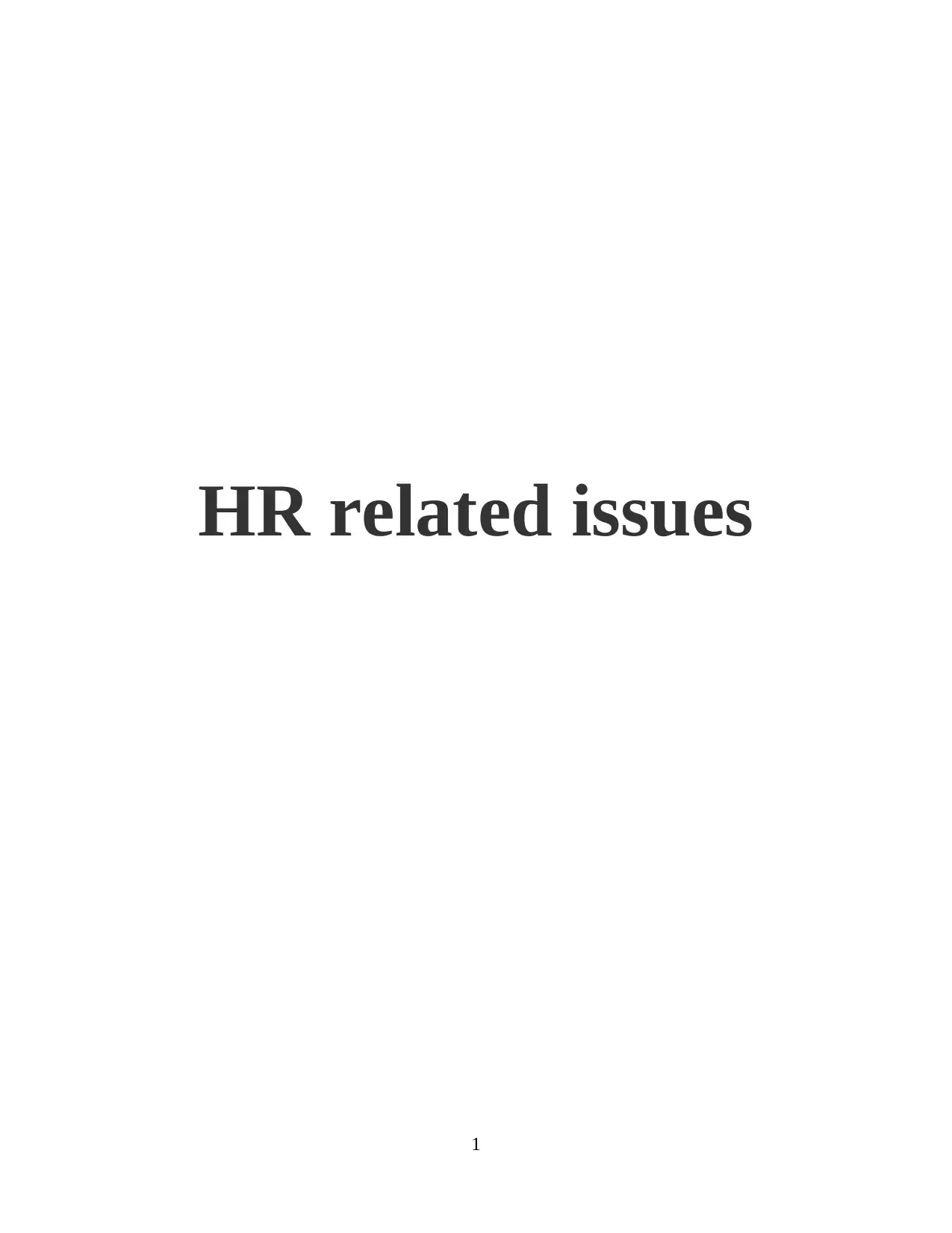
HR related issues
1
1
Paraphrase This Document
Need a fresh take? Get an instant paraphrase of this document with our AI Paraphraser
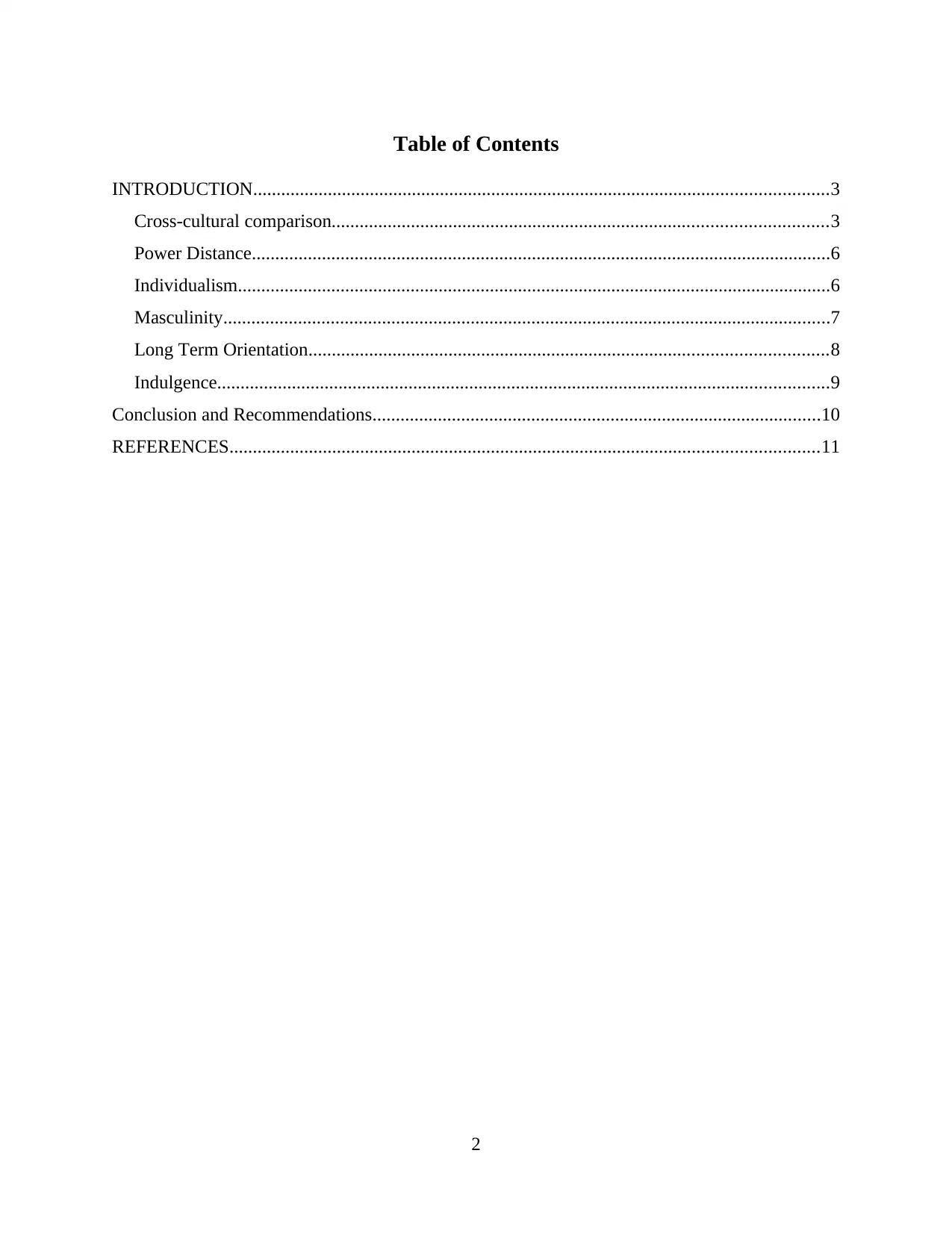
Table of Contents
INTRODUCTION...........................................................................................................................3
Cross-cultural comparison..........................................................................................................3
Power Distance............................................................................................................................6
Individualism...............................................................................................................................6
Masculinity..................................................................................................................................7
Long Term Orientation...............................................................................................................8
Indulgence...................................................................................................................................9
Conclusion and Recommendations................................................................................................10
REFERENCES..............................................................................................................................11
2
INTRODUCTION...........................................................................................................................3
Cross-cultural comparison..........................................................................................................3
Power Distance............................................................................................................................6
Individualism...............................................................................................................................6
Masculinity..................................................................................................................................7
Long Term Orientation...............................................................................................................8
Indulgence...................................................................................................................................9
Conclusion and Recommendations................................................................................................10
REFERENCES..............................................................................................................................11
2
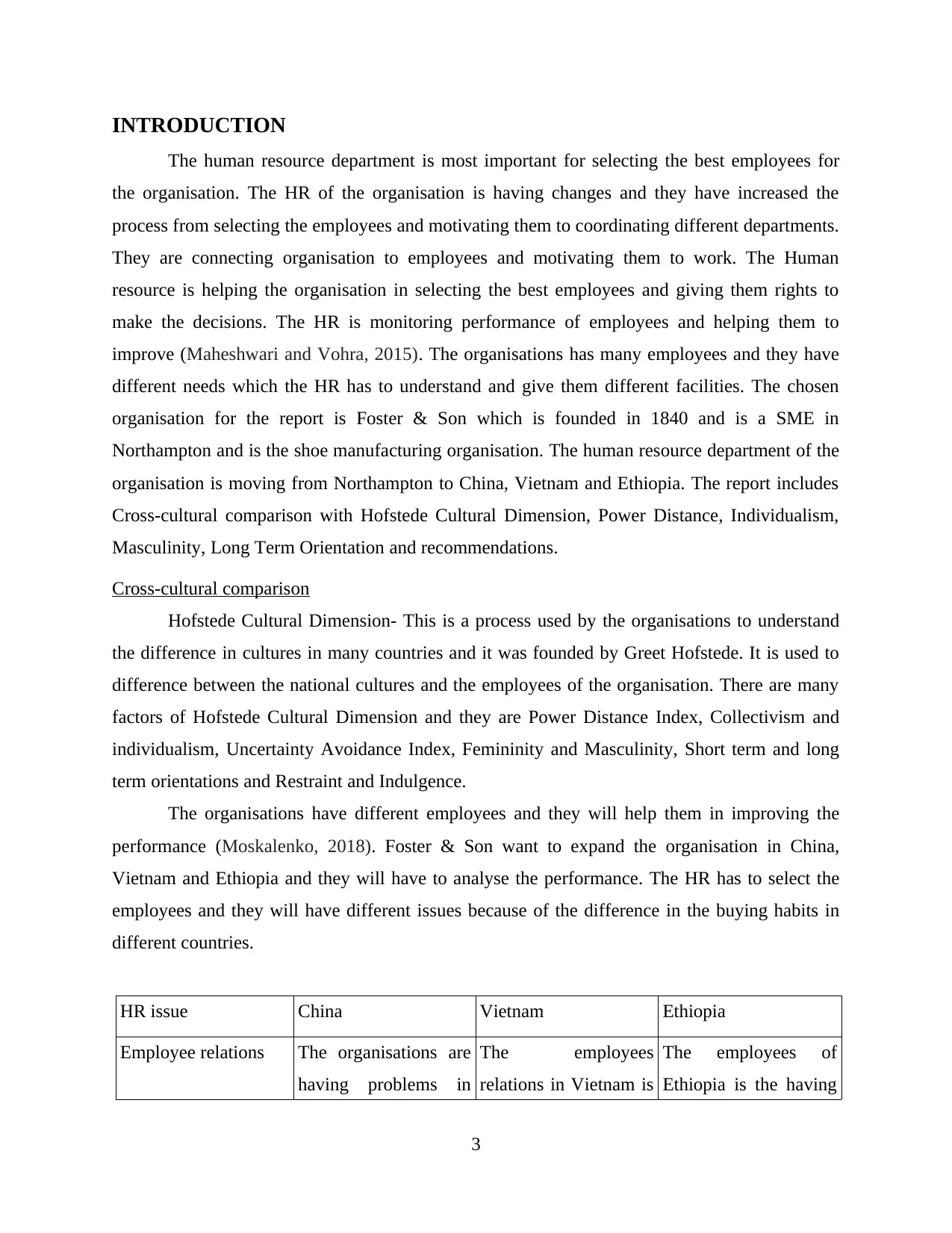
INTRODUCTION
The human resource department is most important for selecting the best employees for
the organisation. The HR of the organisation is having changes and they have increased the
process from selecting the employees and motivating them to coordinating different departments.
They are connecting organisation to employees and motivating them to work. The Human
resource is helping the organisation in selecting the best employees and giving them rights to
make the decisions. The HR is monitoring performance of employees and helping them to
improve (Maheshwari and Vohra, 2015). The organisations has many employees and they have
different needs which the HR has to understand and give them different facilities. The chosen
organisation for the report is Foster & Son which is founded in 1840 and is a SME in
Northampton and is the shoe manufacturing organisation. The human resource department of the
organisation is moving from Northampton to China, Vietnam and Ethiopia. The report includes
Cross-cultural comparison with Hofstede Cultural Dimension, Power Distance, Individualism,
Masculinity, Long Term Orientation and recommendations.
Cross-cultural comparison
Hofstede Cultural Dimension- This is a process used by the organisations to understand
the difference in cultures in many countries and it was founded by Greet Hofstede. It is used to
difference between the national cultures and the employees of the organisation. There are many
factors of Hofstede Cultural Dimension and they are Power Distance Index, Collectivism and
individualism, Uncertainty Avoidance Index, Femininity and Masculinity, Short term and long
term orientations and Restraint and Indulgence.
The organisations have different employees and they will help them in improving the
performance (Moskalenko, 2018). Foster & Son want to expand the organisation in China,
Vietnam and Ethiopia and they will have to analyse the performance. The HR has to select the
employees and they will have different issues because of the difference in the buying habits in
different countries.
HR issue China Vietnam Ethiopia
Employee relations The organisations are
having problems in
The employees
relations in Vietnam is
The employees of
Ethiopia is the having
3
The human resource department is most important for selecting the best employees for
the organisation. The HR of the organisation is having changes and they have increased the
process from selecting the employees and motivating them to coordinating different departments.
They are connecting organisation to employees and motivating them to work. The Human
resource is helping the organisation in selecting the best employees and giving them rights to
make the decisions. The HR is monitoring performance of employees and helping them to
improve (Maheshwari and Vohra, 2015). The organisations has many employees and they have
different needs which the HR has to understand and give them different facilities. The chosen
organisation for the report is Foster & Son which is founded in 1840 and is a SME in
Northampton and is the shoe manufacturing organisation. The human resource department of the
organisation is moving from Northampton to China, Vietnam and Ethiopia. The report includes
Cross-cultural comparison with Hofstede Cultural Dimension, Power Distance, Individualism,
Masculinity, Long Term Orientation and recommendations.
Cross-cultural comparison
Hofstede Cultural Dimension- This is a process used by the organisations to understand
the difference in cultures in many countries and it was founded by Greet Hofstede. It is used to
difference between the national cultures and the employees of the organisation. There are many
factors of Hofstede Cultural Dimension and they are Power Distance Index, Collectivism and
individualism, Uncertainty Avoidance Index, Femininity and Masculinity, Short term and long
term orientations and Restraint and Indulgence.
The organisations have different employees and they will help them in improving the
performance (Moskalenko, 2018). Foster & Son want to expand the organisation in China,
Vietnam and Ethiopia and they will have to analyse the performance. The HR has to select the
employees and they will have different issues because of the difference in the buying habits in
different countries.
HR issue China Vietnam Ethiopia
Employee relations The organisations are
having problems in
The employees
relations in Vietnam is
The employees of
Ethiopia is the having
3
⊘ This is a preview!⊘
Do you want full access?
Subscribe today to unlock all pages.

Trusted by 1+ million students worldwide
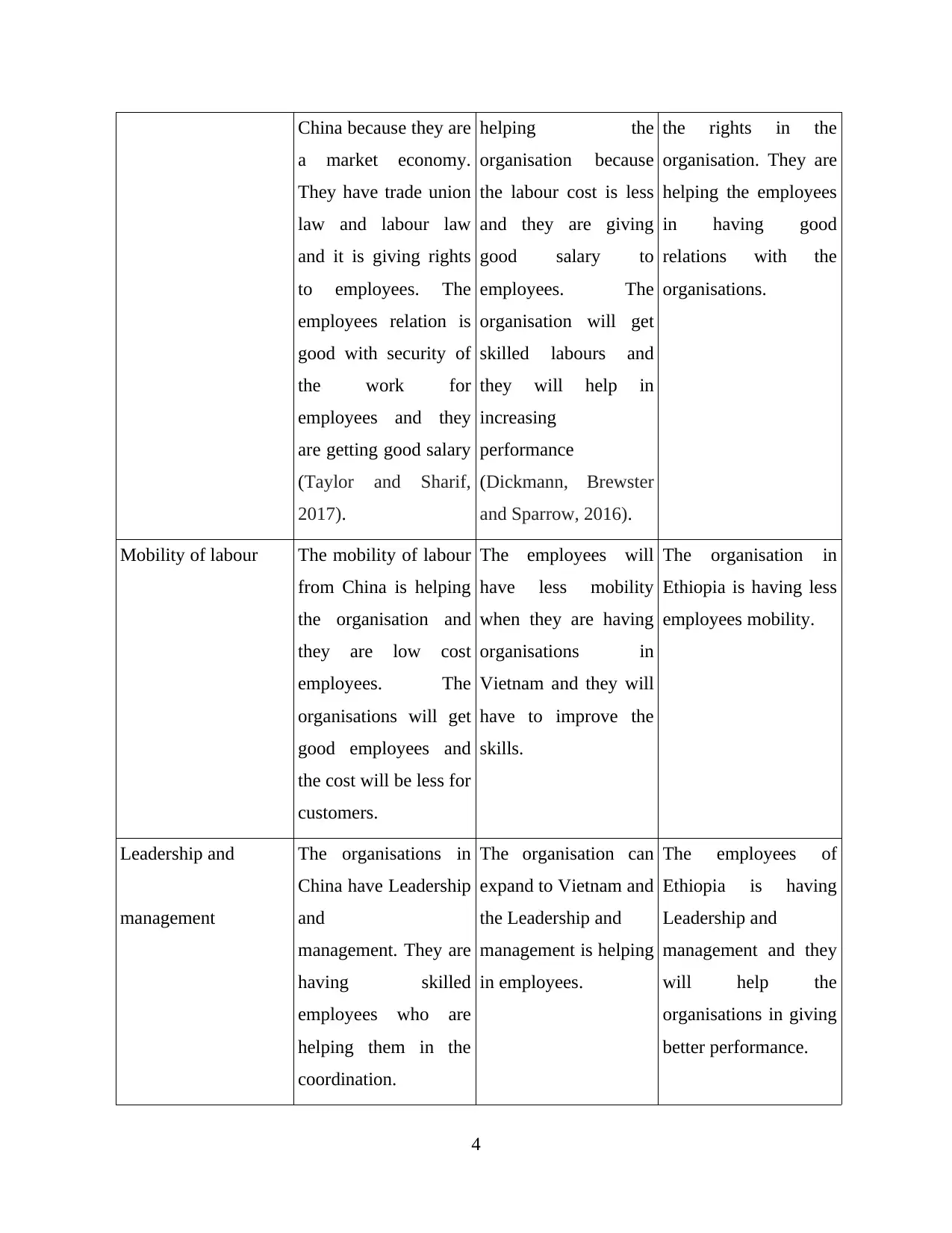
China because they are
a market economy.
They have trade union
law and labour law
and it is giving rights
to employees. The
employees relation is
good with security of
the work for
employees and they
are getting good salary
(Taylor and Sharif,
2017).
helping the
organisation because
the labour cost is less
and they are giving
good salary to
employees. The
organisation will get
skilled labours and
they will help in
increasing
performance
(Dickmann, Brewster
and Sparrow, 2016).
the rights in the
organisation. They are
helping the employees
in having good
relations with the
organisations.
Mobility of labour The mobility of labour
from China is helping
the organisation and
they are low cost
employees. The
organisations will get
good employees and
the cost will be less for
customers.
The employees will
have less mobility
when they are having
organisations in
Vietnam and they will
have to improve the
skills.
The organisation in
Ethiopia is having less
employees mobility.
Leadership and
management
The organisations in
China have Leadership
and
management. They are
having skilled
employees who are
helping them in the
coordination.
The organisation can
expand to Vietnam and
the Leadership and
management is helping
in employees.
The employees of
Ethiopia is having
Leadership and
management and they
will help the
organisations in giving
better performance.
4
a market economy.
They have trade union
law and labour law
and it is giving rights
to employees. The
employees relation is
good with security of
the work for
employees and they
are getting good salary
(Taylor and Sharif,
2017).
helping the
organisation because
the labour cost is less
and they are giving
good salary to
employees. The
organisation will get
skilled labours and
they will help in
increasing
performance
(Dickmann, Brewster
and Sparrow, 2016).
the rights in the
organisation. They are
helping the employees
in having good
relations with the
organisations.
Mobility of labour The mobility of labour
from China is helping
the organisation and
they are low cost
employees. The
organisations will get
good employees and
the cost will be less for
customers.
The employees will
have less mobility
when they are having
organisations in
Vietnam and they will
have to improve the
skills.
The organisation in
Ethiopia is having less
employees mobility.
Leadership and
management
The organisations in
China have Leadership
and
management. They are
having skilled
employees who are
helping them in the
coordination.
The organisation can
expand to Vietnam and
the Leadership and
management is helping
in employees.
The employees of
Ethiopia is having
Leadership and
management and they
will help the
organisations in giving
better performance.
4
Paraphrase This Document
Need a fresh take? Get an instant paraphrase of this document with our AI Paraphraser
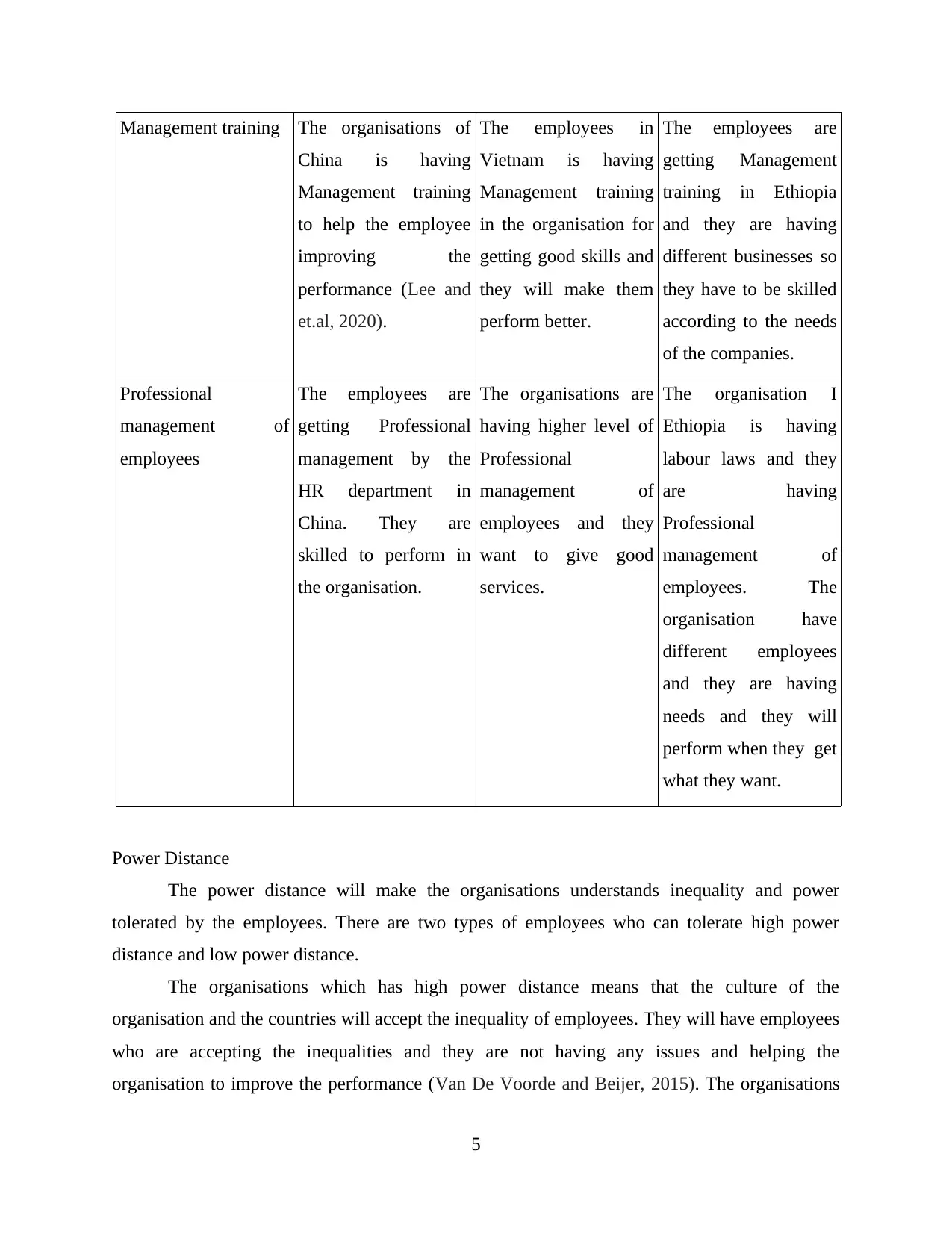
Management training The organisations of
China is having
Management training
to help the employee
improving the
performance (Lee and
et.al, 2020).
The employees in
Vietnam is having
Management training
in the organisation for
getting good skills and
they will make them
perform better.
The employees are
getting Management
training in Ethiopia
and they are having
different businesses so
they have to be skilled
according to the needs
of the companies.
Professional
management of
employees
The employees are
getting Professional
management by the
HR department in
China. They are
skilled to perform in
the organisation.
The organisations are
having higher level of
Professional
management of
employees and they
want to give good
services.
The organisation I
Ethiopia is having
labour laws and they
are having
Professional
management of
employees. The
organisation have
different employees
and they are having
needs and they will
perform when they get
what they want.
Power Distance
The power distance will make the organisations understands inequality and power
tolerated by the employees. There are two types of employees who can tolerate high power
distance and low power distance.
The organisations which has high power distance means that the culture of the
organisation and the countries will accept the inequality of employees. They will have employees
who are accepting the inequalities and they are not having any issues and helping the
organisation to improve the performance (Van De Voorde and Beijer, 2015). The organisations
5
China is having
Management training
to help the employee
improving the
performance (Lee and
et.al, 2020).
The employees in
Vietnam is having
Management training
in the organisation for
getting good skills and
they will make them
perform better.
The employees are
getting Management
training in Ethiopia
and they are having
different businesses so
they have to be skilled
according to the needs
of the companies.
Professional
management of
employees
The employees are
getting Professional
management by the
HR department in
China. They are
skilled to perform in
the organisation.
The organisations are
having higher level of
Professional
management of
employees and they
want to give good
services.
The organisation I
Ethiopia is having
labour laws and they
are having
Professional
management of
employees. The
organisation have
different employees
and they are having
needs and they will
perform when they get
what they want.
Power Distance
The power distance will make the organisations understands inequality and power
tolerated by the employees. There are two types of employees who can tolerate high power
distance and low power distance.
The organisations which has high power distance means that the culture of the
organisation and the countries will accept the inequality of employees. They will have employees
who are accepting the inequalities and they are not having any issues and helping the
organisation to improve the performance (Van De Voorde and Beijer, 2015). The organisations
5
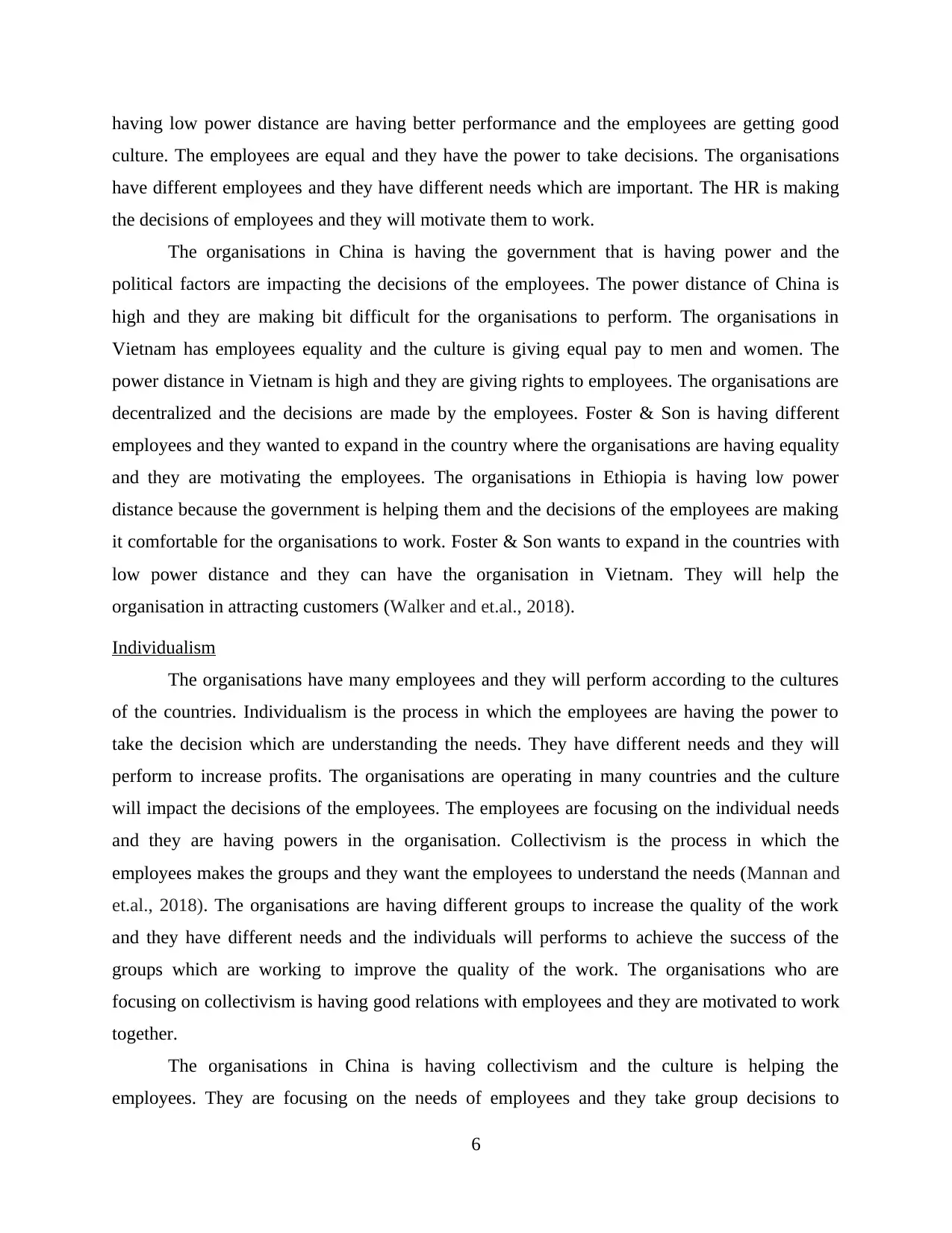
having low power distance are having better performance and the employees are getting good
culture. The employees are equal and they have the power to take decisions. The organisations
have different employees and they have different needs which are important. The HR is making
the decisions of employees and they will motivate them to work.
The organisations in China is having the government that is having power and the
political factors are impacting the decisions of the employees. The power distance of China is
high and they are making bit difficult for the organisations to perform. The organisations in
Vietnam has employees equality and the culture is giving equal pay to men and women. The
power distance in Vietnam is high and they are giving rights to employees. The organisations are
decentralized and the decisions are made by the employees. Foster & Son is having different
employees and they wanted to expand in the country where the organisations are having equality
and they are motivating the employees. The organisations in Ethiopia is having low power
distance because the government is helping them and the decisions of the employees are making
it comfortable for the organisations to work. Foster & Son wants to expand in the countries with
low power distance and they can have the organisation in Vietnam. They will help the
organisation in attracting customers (Walker and et.al., 2018).
Individualism
The organisations have many employees and they will perform according to the cultures
of the countries. Individualism is the process in which the employees are having the power to
take the decision which are understanding the needs. They have different needs and they will
perform to increase profits. The organisations are operating in many countries and the culture
will impact the decisions of the employees. The employees are focusing on the individual needs
and they are having powers in the organisation. Collectivism is the process in which the
employees makes the groups and they want the employees to understand the needs (Mannan and
et.al., 2018). The organisations are having different groups to increase the quality of the work
and they have different needs and the individuals will performs to achieve the success of the
groups which are working to improve the quality of the work. The organisations who are
focusing on collectivism is having good relations with employees and they are motivated to work
together.
The organisations in China is having collectivism and the culture is helping the
employees. They are focusing on the needs of employees and they take group decisions to
6
culture. The employees are equal and they have the power to take decisions. The organisations
have different employees and they have different needs which are important. The HR is making
the decisions of employees and they will motivate them to work.
The organisations in China is having the government that is having power and the
political factors are impacting the decisions of the employees. The power distance of China is
high and they are making bit difficult for the organisations to perform. The organisations in
Vietnam has employees equality and the culture is giving equal pay to men and women. The
power distance in Vietnam is high and they are giving rights to employees. The organisations are
decentralized and the decisions are made by the employees. Foster & Son is having different
employees and they wanted to expand in the country where the organisations are having equality
and they are motivating the employees. The organisations in Ethiopia is having low power
distance because the government is helping them and the decisions of the employees are making
it comfortable for the organisations to work. Foster & Son wants to expand in the countries with
low power distance and they can have the organisation in Vietnam. They will help the
organisation in attracting customers (Walker and et.al., 2018).
Individualism
The organisations have many employees and they will perform according to the cultures
of the countries. Individualism is the process in which the employees are having the power to
take the decision which are understanding the needs. They have different needs and they will
perform to increase profits. The organisations are operating in many countries and the culture
will impact the decisions of the employees. The employees are focusing on the individual needs
and they are having powers in the organisation. Collectivism is the process in which the
employees makes the groups and they want the employees to understand the needs (Mannan and
et.al., 2018). The organisations are having different groups to increase the quality of the work
and they have different needs and the individuals will performs to achieve the success of the
groups which are working to improve the quality of the work. The organisations who are
focusing on collectivism is having good relations with employees and they are motivated to work
together.
The organisations in China is having collectivism and the culture is helping the
employees. They are focusing on the needs of employees and they take group decisions to
6
⊘ This is a preview!⊘
Do you want full access?
Subscribe today to unlock all pages.

Trusted by 1+ million students worldwide
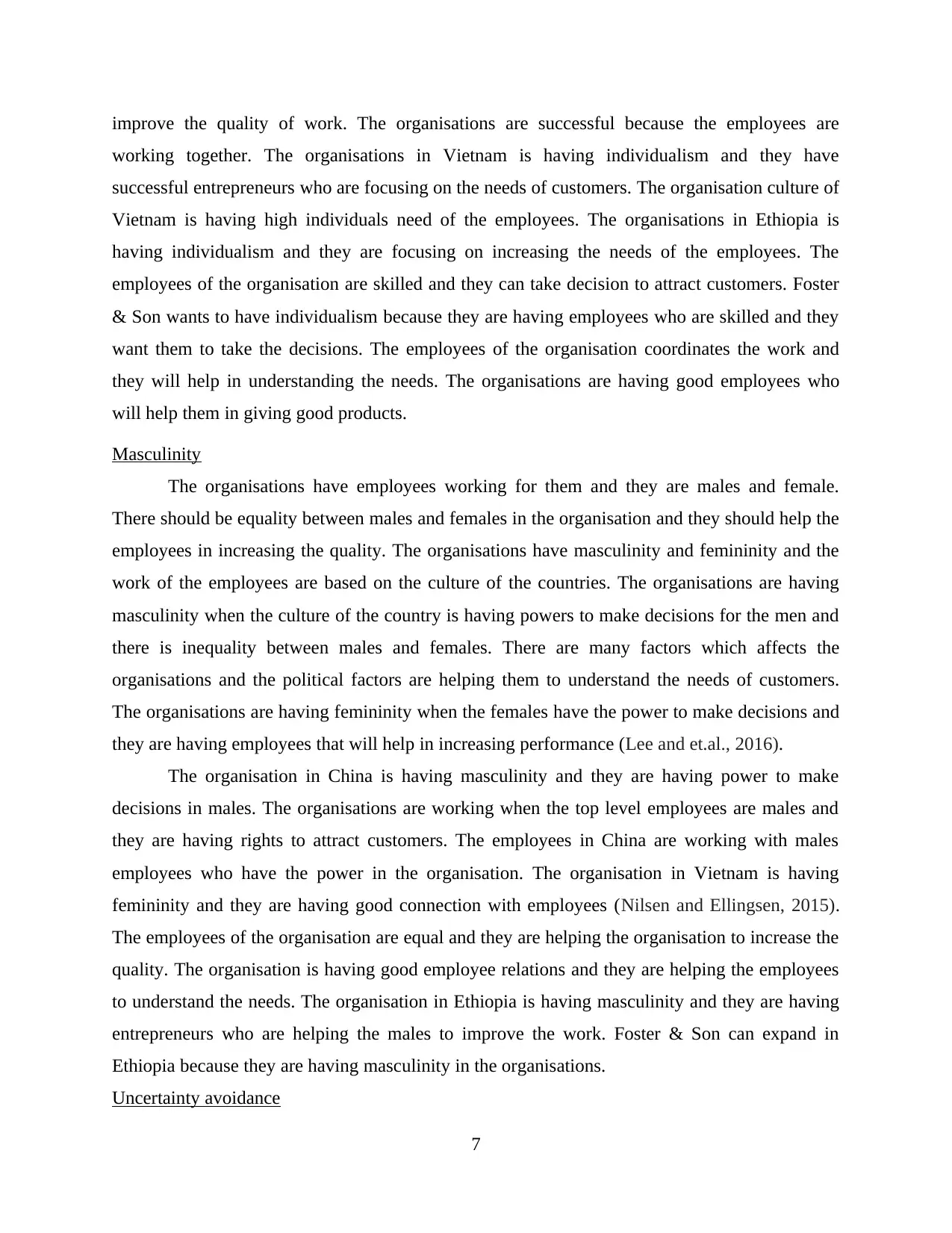
improve the quality of work. The organisations are successful because the employees are
working together. The organisations in Vietnam is having individualism and they have
successful entrepreneurs who are focusing on the needs of customers. The organisation culture of
Vietnam is having high individuals need of the employees. The organisations in Ethiopia is
having individualism and they are focusing on increasing the needs of the employees. The
employees of the organisation are skilled and they can take decision to attract customers. Foster
& Son wants to have individualism because they are having employees who are skilled and they
want them to take the decisions. The employees of the organisation coordinates the work and
they will help in understanding the needs. The organisations are having good employees who
will help them in giving good products.
Masculinity
The organisations have employees working for them and they are males and female.
There should be equality between males and females in the organisation and they should help the
employees in increasing the quality. The organisations have masculinity and femininity and the
work of the employees are based on the culture of the countries. The organisations are having
masculinity when the culture of the country is having powers to make decisions for the men and
there is inequality between males and females. There are many factors which affects the
organisations and the political factors are helping them to understand the needs of customers.
The organisations are having femininity when the females have the power to make decisions and
they are having employees that will help in increasing performance (Lee and et.al., 2016).
The organisation in China is having masculinity and they are having power to make
decisions in males. The organisations are working when the top level employees are males and
they are having rights to attract customers. The employees in China are working with males
employees who have the power in the organisation. The organisation in Vietnam is having
femininity and they are having good connection with employees (Nilsen and Ellingsen, 2015).
The employees of the organisation are equal and they are helping the organisation to increase the
quality. The organisation is having good employee relations and they are helping the employees
to understand the needs. The organisation in Ethiopia is having masculinity and they are having
entrepreneurs who are helping the males to improve the work. Foster & Son can expand in
Ethiopia because they are having masculinity in the organisations.
Uncertainty avoidance
7
working together. The organisations in Vietnam is having individualism and they have
successful entrepreneurs who are focusing on the needs of customers. The organisation culture of
Vietnam is having high individuals need of the employees. The organisations in Ethiopia is
having individualism and they are focusing on increasing the needs of the employees. The
employees of the organisation are skilled and they can take decision to attract customers. Foster
& Son wants to have individualism because they are having employees who are skilled and they
want them to take the decisions. The employees of the organisation coordinates the work and
they will help in understanding the needs. The organisations are having good employees who
will help them in giving good products.
Masculinity
The organisations have employees working for them and they are males and female.
There should be equality between males and females in the organisation and they should help the
employees in increasing the quality. The organisations have masculinity and femininity and the
work of the employees are based on the culture of the countries. The organisations are having
masculinity when the culture of the country is having powers to make decisions for the men and
there is inequality between males and females. There are many factors which affects the
organisations and the political factors are helping them to understand the needs of customers.
The organisations are having femininity when the females have the power to make decisions and
they are having employees that will help in increasing performance (Lee and et.al., 2016).
The organisation in China is having masculinity and they are having power to make
decisions in males. The organisations are working when the top level employees are males and
they are having rights to attract customers. The employees in China are working with males
employees who have the power in the organisation. The organisation in Vietnam is having
femininity and they are having good connection with employees (Nilsen and Ellingsen, 2015).
The employees of the organisation are equal and they are helping the organisation to increase the
quality. The organisation is having good employee relations and they are helping the employees
to understand the needs. The organisation in Ethiopia is having masculinity and they are having
entrepreneurs who are helping the males to improve the work. Foster & Son can expand in
Ethiopia because they are having masculinity in the organisations.
Uncertainty avoidance
7
Paraphrase This Document
Need a fresh take? Get an instant paraphrase of this document with our AI Paraphraser
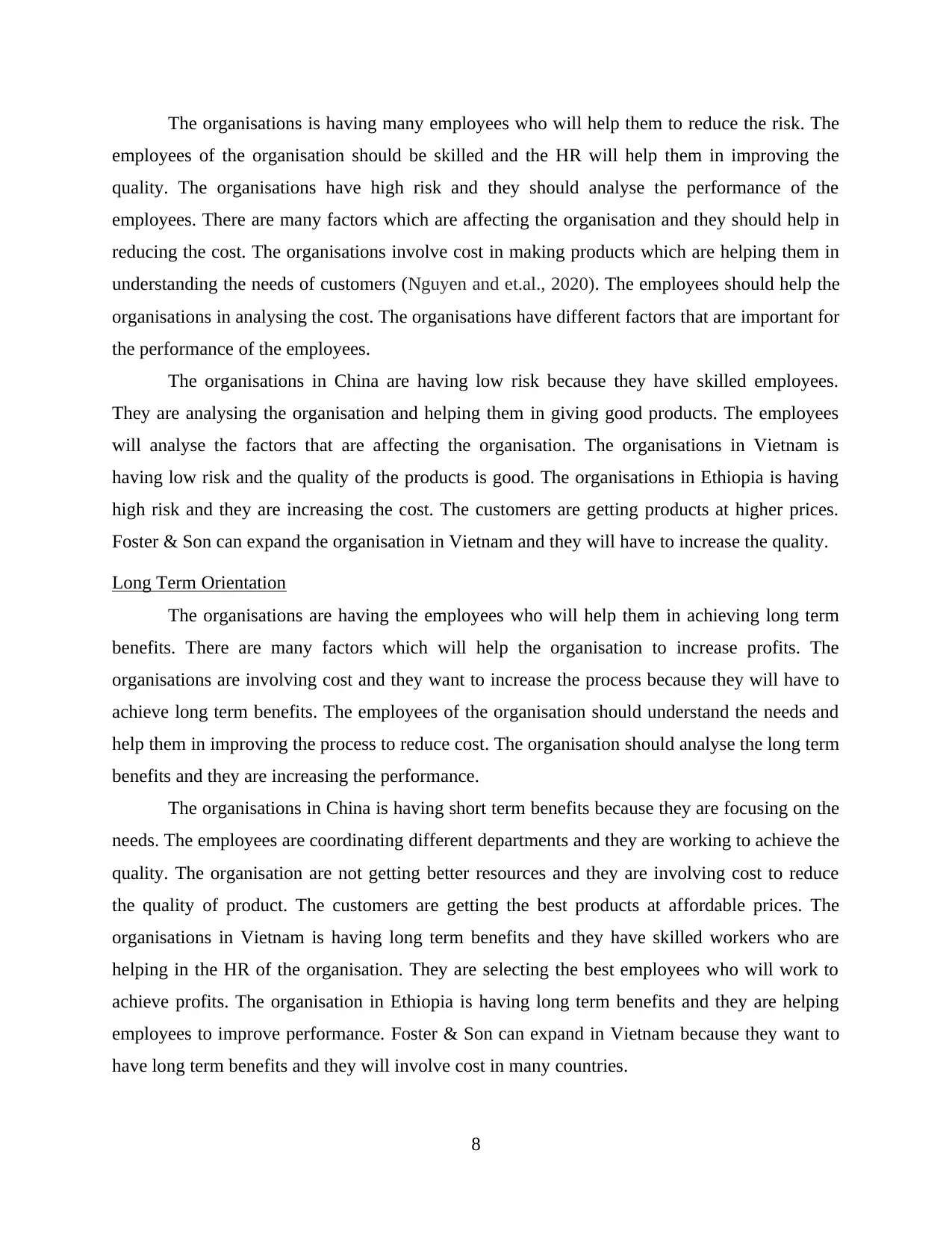
The organisations is having many employees who will help them to reduce the risk. The
employees of the organisation should be skilled and the HR will help them in improving the
quality. The organisations have high risk and they should analyse the performance of the
employees. There are many factors which are affecting the organisation and they should help in
reducing the cost. The organisations involve cost in making products which are helping them in
understanding the needs of customers (Nguyen and et.al., 2020). The employees should help the
organisations in analysing the cost. The organisations have different factors that are important for
the performance of the employees.
The organisations in China are having low risk because they have skilled employees.
They are analysing the organisation and helping them in giving good products. The employees
will analyse the factors that are affecting the organisation. The organisations in Vietnam is
having low risk and the quality of the products is good. The organisations in Ethiopia is having
high risk and they are increasing the cost. The customers are getting products at higher prices.
Foster & Son can expand the organisation in Vietnam and they will have to increase the quality.
Long Term Orientation
The organisations are having the employees who will help them in achieving long term
benefits. There are many factors which will help the organisation to increase profits. The
organisations are involving cost and they want to increase the process because they will have to
achieve long term benefits. The employees of the organisation should understand the needs and
help them in improving the process to reduce cost. The organisation should analyse the long term
benefits and they are increasing the performance.
The organisations in China is having short term benefits because they are focusing on the
needs. The employees are coordinating different departments and they are working to achieve the
quality. The organisation are not getting better resources and they are involving cost to reduce
the quality of product. The customers are getting the best products at affordable prices. The
organisations in Vietnam is having long term benefits and they have skilled workers who are
helping in the HR of the organisation. They are selecting the best employees who will work to
achieve profits. The organisation in Ethiopia is having long term benefits and they are helping
employees to improve performance. Foster & Son can expand in Vietnam because they want to
have long term benefits and they will involve cost in many countries.
8
employees of the organisation should be skilled and the HR will help them in improving the
quality. The organisations have high risk and they should analyse the performance of the
employees. There are many factors which are affecting the organisation and they should help in
reducing the cost. The organisations involve cost in making products which are helping them in
understanding the needs of customers (Nguyen and et.al., 2020). The employees should help the
organisations in analysing the cost. The organisations have different factors that are important for
the performance of the employees.
The organisations in China are having low risk because they have skilled employees.
They are analysing the organisation and helping them in giving good products. The employees
will analyse the factors that are affecting the organisation. The organisations in Vietnam is
having low risk and the quality of the products is good. The organisations in Ethiopia is having
high risk and they are increasing the cost. The customers are getting products at higher prices.
Foster & Son can expand the organisation in Vietnam and they will have to increase the quality.
Long Term Orientation
The organisations are having the employees who will help them in achieving long term
benefits. There are many factors which will help the organisation to increase profits. The
organisations are involving cost and they want to increase the process because they will have to
achieve long term benefits. The employees of the organisation should understand the needs and
help them in improving the process to reduce cost. The organisation should analyse the long term
benefits and they are increasing the performance.
The organisations in China is having short term benefits because they are focusing on the
needs. The employees are coordinating different departments and they are working to achieve the
quality. The organisation are not getting better resources and they are involving cost to reduce
the quality of product. The customers are getting the best products at affordable prices. The
organisations in Vietnam is having long term benefits and they have skilled workers who are
helping in the HR of the organisation. They are selecting the best employees who will work to
achieve profits. The organisation in Ethiopia is having long term benefits and they are helping
employees to improve performance. Foster & Son can expand in Vietnam because they want to
have long term benefits and they will involve cost in many countries.
8
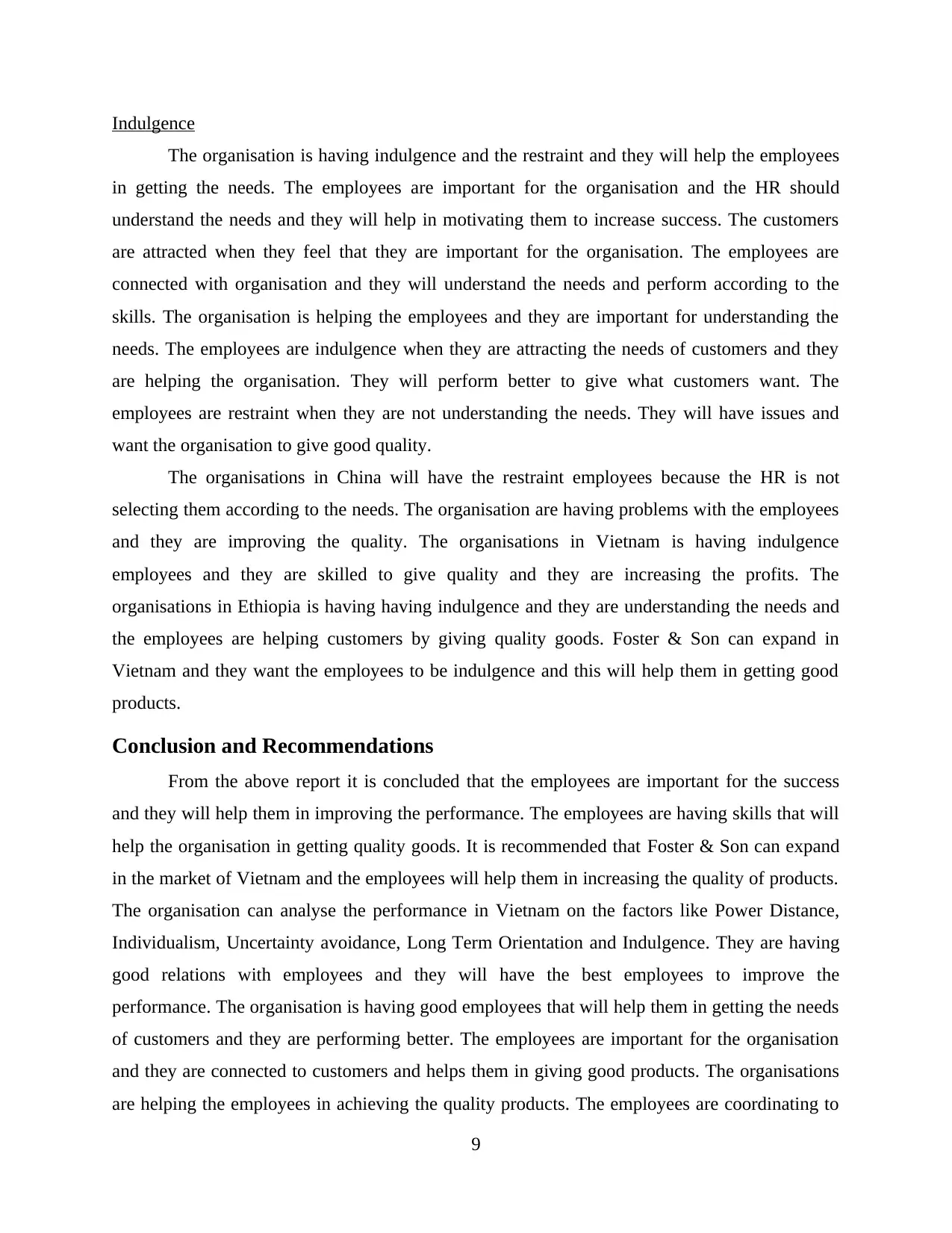
Indulgence
The organisation is having indulgence and the restraint and they will help the employees
in getting the needs. The employees are important for the organisation and the HR should
understand the needs and they will help in motivating them to increase success. The customers
are attracted when they feel that they are important for the organisation. The employees are
connected with organisation and they will understand the needs and perform according to the
skills. The organisation is helping the employees and they are important for understanding the
needs. The employees are indulgence when they are attracting the needs of customers and they
are helping the organisation. They will perform better to give what customers want. The
employees are restraint when they are not understanding the needs. They will have issues and
want the organisation to give good quality.
The organisations in China will have the restraint employees because the HR is not
selecting them according to the needs. The organisation are having problems with the employees
and they are improving the quality. The organisations in Vietnam is having indulgence
employees and they are skilled to give quality and they are increasing the profits. The
organisations in Ethiopia is having having indulgence and they are understanding the needs and
the employees are helping customers by giving quality goods. Foster & Son can expand in
Vietnam and they want the employees to be indulgence and this will help them in getting good
products.
Conclusion and Recommendations
From the above report it is concluded that the employees are important for the success
and they will help them in improving the performance. The employees are having skills that will
help the organisation in getting quality goods. It is recommended that Foster & Son can expand
in the market of Vietnam and the employees will help them in increasing the quality of products.
The organisation can analyse the performance in Vietnam on the factors like Power Distance,
Individualism, Uncertainty avoidance, Long Term Orientation and Indulgence. They are having
good relations with employees and they will have the best employees to improve the
performance. The organisation is having good employees that will help them in getting the needs
of customers and they are performing better. The employees are important for the organisation
and they are connected to customers and helps them in giving good products. The organisations
are helping the employees in achieving the quality products. The employees are coordinating to
9
The organisation is having indulgence and the restraint and they will help the employees
in getting the needs. The employees are important for the organisation and the HR should
understand the needs and they will help in motivating them to increase success. The customers
are attracted when they feel that they are important for the organisation. The employees are
connected with organisation and they will understand the needs and perform according to the
skills. The organisation is helping the employees and they are important for understanding the
needs. The employees are indulgence when they are attracting the needs of customers and they
are helping the organisation. They will perform better to give what customers want. The
employees are restraint when they are not understanding the needs. They will have issues and
want the organisation to give good quality.
The organisations in China will have the restraint employees because the HR is not
selecting them according to the needs. The organisation are having problems with the employees
and they are improving the quality. The organisations in Vietnam is having indulgence
employees and they are skilled to give quality and they are increasing the profits. The
organisations in Ethiopia is having having indulgence and they are understanding the needs and
the employees are helping customers by giving quality goods. Foster & Son can expand in
Vietnam and they want the employees to be indulgence and this will help them in getting good
products.
Conclusion and Recommendations
From the above report it is concluded that the employees are important for the success
and they will help them in improving the performance. The employees are having skills that will
help the organisation in getting quality goods. It is recommended that Foster & Son can expand
in the market of Vietnam and the employees will help them in increasing the quality of products.
The organisation can analyse the performance in Vietnam on the factors like Power Distance,
Individualism, Uncertainty avoidance, Long Term Orientation and Indulgence. They are having
good relations with employees and they will have the best employees to improve the
performance. The organisation is having good employees that will help them in getting the needs
of customers and they are performing better. The employees are important for the organisation
and they are connected to customers and helps them in giving good products. The organisations
are helping the employees in achieving the quality products. The employees are coordinating to
9
⊘ This is a preview!⊘
Do you want full access?
Subscribe today to unlock all pages.

Trusted by 1+ million students worldwide
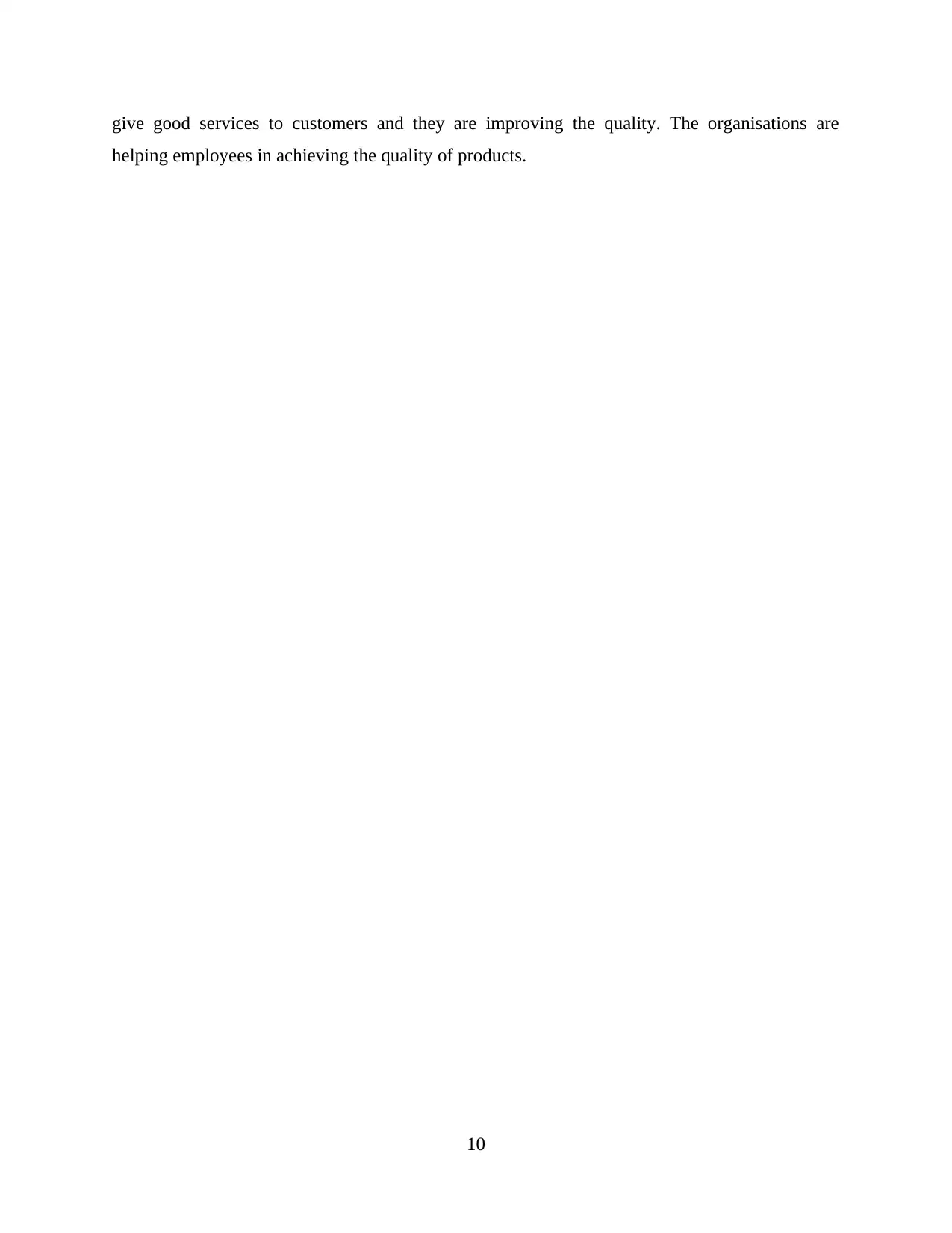
give good services to customers and they are improving the quality. The organisations are
helping employees in achieving the quality of products.
10
helping employees in achieving the quality of products.
10
Paraphrase This Document
Need a fresh take? Get an instant paraphrase of this document with our AI Paraphraser
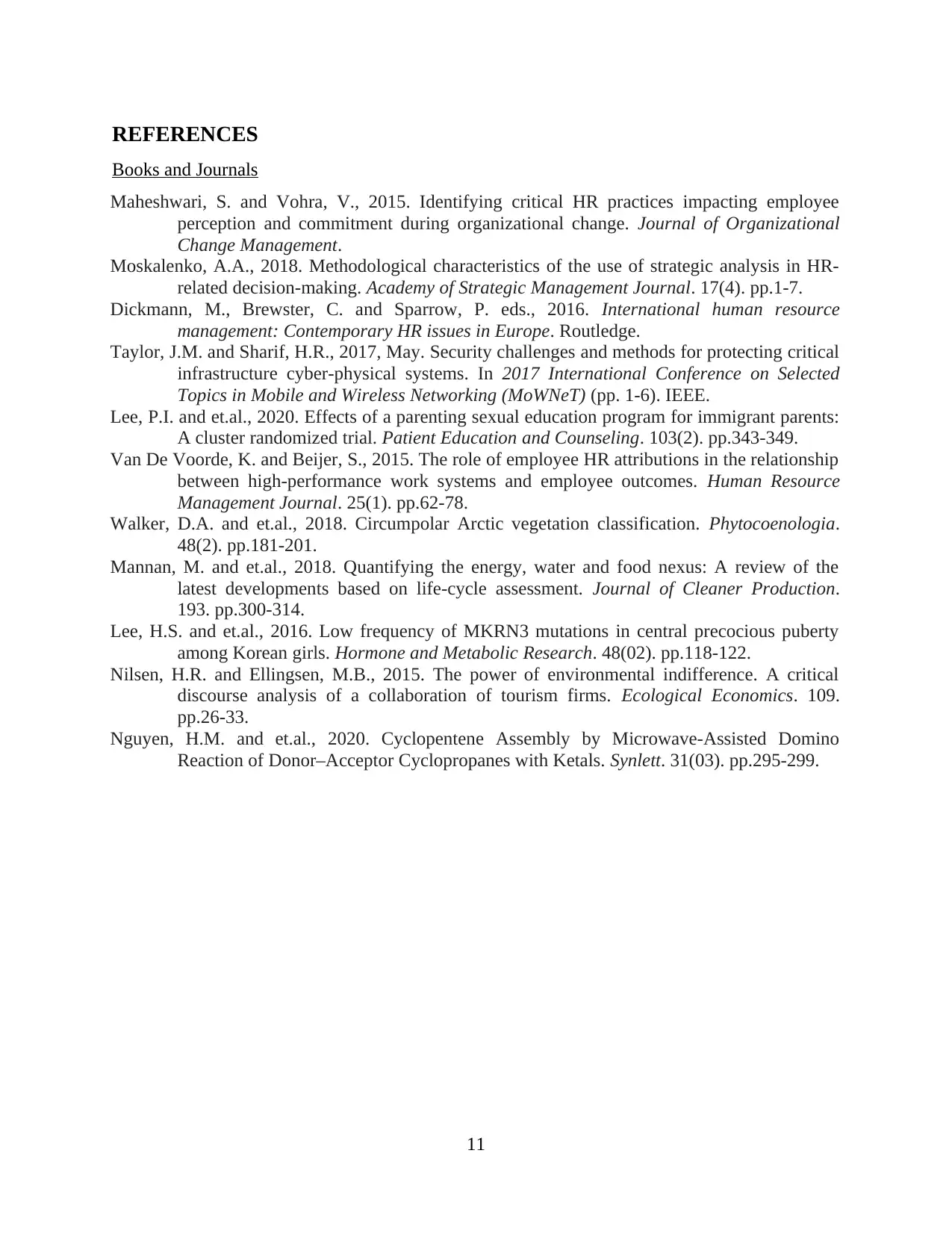
REFERENCES
Books and Journals
Maheshwari, S. and Vohra, V., 2015. Identifying critical HR practices impacting employee
perception and commitment during organizational change. Journal of Organizational
Change Management.
Moskalenko, A.A., 2018. Methodological characteristics of the use of strategic analysis in HR-
related decision-making. Academy of Strategic Management Journal. 17(4). pp.1-7.
Dickmann, M., Brewster, C. and Sparrow, P. eds., 2016. International human resource
management: Contemporary HR issues in Europe. Routledge.
Taylor, J.M. and Sharif, H.R., 2017, May. Security challenges and methods for protecting critical
infrastructure cyber-physical systems. In 2017 International Conference on Selected
Topics in Mobile and Wireless Networking (MoWNeT) (pp. 1-6). IEEE.
Lee, P.I. and et.al., 2020. Effects of a parenting sexual education program for immigrant parents:
A cluster randomized trial. Patient Education and Counseling. 103(2). pp.343-349.
Van De Voorde, K. and Beijer, S., 2015. The role of employee HR attributions in the relationship
between high‐performance work systems and employee outcomes. Human Resource
Management Journal. 25(1). pp.62-78.
Walker, D.A. and et.al., 2018. Circumpolar Arctic vegetation classification. Phytocoenologia.
48(2). pp.181-201.
Mannan, M. and et.al., 2018. Quantifying the energy, water and food nexus: A review of the
latest developments based on life-cycle assessment. Journal of Cleaner Production.
193. pp.300-314.
Lee, H.S. and et.al., 2016. Low frequency of MKRN3 mutations in central precocious puberty
among Korean girls. Hormone and Metabolic Research. 48(02). pp.118-122.
Nilsen, H.R. and Ellingsen, M.B., 2015. The power of environmental indifference. A critical
discourse analysis of a collaboration of tourism firms. Ecological Economics. 109.
pp.26-33.
Nguyen, H.M. and et.al., 2020. Cyclopentene Assembly by Microwave-Assisted Domino
Reaction of Donor–Acceptor Cyclopropanes with Ketals. Synlett. 31(03). pp.295-299.
11
Books and Journals
Maheshwari, S. and Vohra, V., 2015. Identifying critical HR practices impacting employee
perception and commitment during organizational change. Journal of Organizational
Change Management.
Moskalenko, A.A., 2018. Methodological characteristics of the use of strategic analysis in HR-
related decision-making. Academy of Strategic Management Journal. 17(4). pp.1-7.
Dickmann, M., Brewster, C. and Sparrow, P. eds., 2016. International human resource
management: Contemporary HR issues in Europe. Routledge.
Taylor, J.M. and Sharif, H.R., 2017, May. Security challenges and methods for protecting critical
infrastructure cyber-physical systems. In 2017 International Conference on Selected
Topics in Mobile and Wireless Networking (MoWNeT) (pp. 1-6). IEEE.
Lee, P.I. and et.al., 2020. Effects of a parenting sexual education program for immigrant parents:
A cluster randomized trial. Patient Education and Counseling. 103(2). pp.343-349.
Van De Voorde, K. and Beijer, S., 2015. The role of employee HR attributions in the relationship
between high‐performance work systems and employee outcomes. Human Resource
Management Journal. 25(1). pp.62-78.
Walker, D.A. and et.al., 2018. Circumpolar Arctic vegetation classification. Phytocoenologia.
48(2). pp.181-201.
Mannan, M. and et.al., 2018. Quantifying the energy, water and food nexus: A review of the
latest developments based on life-cycle assessment. Journal of Cleaner Production.
193. pp.300-314.
Lee, H.S. and et.al., 2016. Low frequency of MKRN3 mutations in central precocious puberty
among Korean girls. Hormone and Metabolic Research. 48(02). pp.118-122.
Nilsen, H.R. and Ellingsen, M.B., 2015. The power of environmental indifference. A critical
discourse analysis of a collaboration of tourism firms. Ecological Economics. 109.
pp.26-33.
Nguyen, H.M. and et.al., 2020. Cyclopentene Assembly by Microwave-Assisted Domino
Reaction of Donor–Acceptor Cyclopropanes with Ketals. Synlett. 31(03). pp.295-299.
11
1 out of 11
Related Documents
Your All-in-One AI-Powered Toolkit for Academic Success.
+13062052269
info@desklib.com
Available 24*7 on WhatsApp / Email
![[object Object]](/_next/static/media/star-bottom.7253800d.svg)
Unlock your academic potential
Copyright © 2020–2025 A2Z Services. All Rights Reserved. Developed and managed by ZUCOL.





